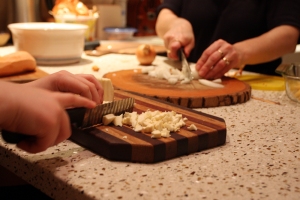Since October, I’ve been working on a multimedia Master’s project on the efforts to improve the nutritional quality of New York City public school lunches. My partner Meredith and I have been to schools in Harlem and Brooklyn, Stone Barns Center for Food and Agriculture and last night, we filmed a dinner at the home of Pamela Koch, of the Teacher’s College at Columbia University. Koch develops children’s curricula focused on nutrition and awareness of where food comes from.
At home, Koch often cooks with her sons, who are 11 and 8, and is a big believer in using local food. She lives in Morningside Heights, and therefore can take advantage of both the Columbia farmer’s market and the Community-Supported Agriculture program in the church on Broadway and 114th (or as I call it, the church next to Starbucks).
NYC foodies know that CSAs are the next big thing in urban local food. Customers pay a fee upfront to join the program, which is basically seed money for farmers (literally. Ha). Then, each week from June to November, farmers drop off pre-specified amounts of 7-10 different veggies, depending on the season. Some CSAs, including Koch’s, also provide winter shares of root vegetables or greens. Shares typically provide enough food to feed a small family, and are usually delivered once a week. There are CSAs throughout Manhattan, and in all five boroughs.
Koch said that her program even has a dairy farmer and meat farmer, and she served some wonderful Jack cheddar from her CSA, as well as root vegetables from her winter box. CSAs are mildly expensive to join (around $600 for a year-round commitment), though they are flexible with payment plans. For a locavore, they’re a great and convenient way to eat local.
Note: After Googling around for a bit, I discovered that some CSAs take food stamps, and there are a number of them located in less-affluent neighborhoods. Part of our Master’s project looks at the challenges of eating healthy. A family’s socio-economic situation is clearly a factor in its ability to eat well, so food stamp-accepting CSAs are definitely something I need to research more.


I think Meredith’s and your project on improving nutritional quality of public school lunches is very noble effort. Hope you can make some impact on the system.
It seems CSA is also a very nice symbiotic program to support healthy nutrition. However, I think you need other ways to circulate this info to less-affluent neighborhoods.
a little part of me cried at the word “Master’s” in your first line. you are such a grownup. what on earth. also, “seed money (literally)” made me laugh because it’s so you to be unable to resist a dorky pun. hahah. love the food blog and love the master’s project!
Hey Ishita! This is really interesting. Food justice and socio-economic disparities are definitely glaringly obvious in the city. I use this example all the time, but last Spring, a professor told me about a kid in the South Bronx who didn’t know what a strawberry is.
Anyway, I know you have a very specific scope to your project, but I urge you to check out http://foodstockings.wordpress.com/ the NYC Food Project. I’m not totally sure about their details, but I know it’s run by good, progressive people.
My class last semester really taught me that this issue can tie together people from a whole slew of backgrounds just because of the essential nature of food.
ps – Loved the seed money joke – I laugh at the corniest things 🙂
Hey Lakshman — it’s so good to hear from you! Thanks so much for the link to the site. We’ll definitely check it out as we put our project together.